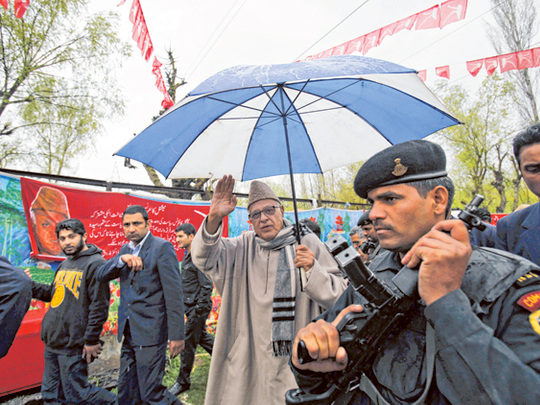
Srinagar: In a highly charged atmosphere of rigorous campaigning for the remaining four phases of polling in Jammu and Kashmir, the scene has changed to a very controversial one.
With two phases of polling having ended in the Jammu division, where the trend shows “not so easy” for the National conference (NC)-Congress alliance”, Chief Minister Omar Abdullah has left his alliance partner Congress red-faced by his statement to an Indian news channel on Friday. He said that those who do not acknowledge the strong undercurrent of the “Modi factor” are living in a fool’s paradise. He went to the extent of accepting that the effect of the “Modi wave” was visible even in the two phases of polling held so far, in the Hindu-dominated Jammu division.
The statement has embarrassed the Congress that has been rejecting existence of any such wave. Contradicting the statement, former chief minister Ghulam Nabi Azad, a senior Congress leader and a candidate from Udhampur-Doda constituency, said there is nothing like “Modi wave” anywhere, but in media.
Dr Farooq Abdullah, NC president, on the other hand created yet another controversy stating that if he had guns and bombs, he would eliminate the People’s Democratic Party (PDP) and its leadership. Talking to reporters on the sidelines of a function in Srinagar on Thursday, Farooq termed the PDP chief Mufti Mohammad Sayed the “eliminator” and said the party was responsible for the killings of NC leaders in south Kashmir.
With one of its workers, a village head (sarpanch) having been short dead the same night in south Kashmir town of Awantipur, PDP president Mehbooba Mufti came down heavily on Dr Abdullah, holding him responsible for the assassination of her party worker and asked the election commission to take the cognisance of the statement and initiate action against him for violating moral code of conduct and issuing threats to his opponents.
In an attempt of damage control, NC leader Devinder Rana said that Farooq’s statement should not be seen as is being projected by the PDP, but simply a metaphor.
The controversies and their fallout in current political scene is not restricted to mainstream politics alone, but has engulfed the atmosphere in separatist camp as well.
Hurriet Conference leader Syed Ali Shah on Friday said that two emissaries of Narendra Modi approached him on March 22 for a meeting with the BJP’s prime ministerial candidate to seek commitment from him on the resolution of the Kashmir Issue. While claiming that he rejected the offer citing Modi’s RSS background, he criticised the softer stand towards the BJP leader by some separatists recently, accusing them of having met the emissaries. Geelani was making an apparent reference to Moderate Hurriet leader Mirwaiz Umer Farooq and Jamaat-e-Islami chief Mohammad Abdullah Wani.
While the BJP rejected Geelani’s statement as a “baseless mischief” and Wani denied to have had any such meeting on Friday, Mirwaiz Umar Farooq flayed him Saturday saying, “who the hell is Geelani”.
Denying having any meeting with Modi’s men he added that Geelani’s such baseless utterances in the past have led to killings of resistance leaders. “Whom does Geelani want to kill now,” he said.
— Jalil Rathor is a journalist based in Kashmir












